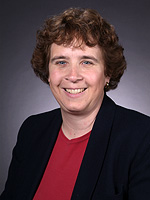Karen Zunkel’s career has covered a lot of territory: as a professional in industry, an instructor and a higher education administrator, she has a good sense of the many obstacles females may face in STEM fields.
That’s why Zunkel, director of undergraduate programs and academic quality at Iowa State, has devoted much of her career to helping other women find success in engineering.
As part of that goal, she recently began her term as president of the Women in Engineering ProActive Network, an organization focused on programmatic efforts within institutions or colleges of engineering that aims to support, recruit, and retain females, as well as change the culture within engineering to help women be successful.
After receiving her bachelor’s degree in industrial engineering in 1983, Zunkel went to work in the telecommunications industry with Western Electric—an AT&T company at the time—in Oklahoma. She started as a product engineer while taking night classes to obtain her master’s from the University of Oklahoma.
Zunkel was then transferred back to Iowa as a sales engineer with AT&T. Later, she took a position as an instructor in the College of Engineering, teaching an introductory freshman engineering course and systems engineering course.
When she began teaching, Zunkel realized she didn’t know that much about developing curriculum and the most effective ways to reach her students, so she started taking classes to get her Ph.D. in higher education from Iowa State.
“It was a nice mix for me. Industrial engineering wasn’t really where my passions were at that time—I was more interested in learning about the students I was teaching,” says Zunkel.
Transitioning from teaching to advising, she managed Engineering Student Services for several years. Then, in 2002, Zunkel became the program director for the Program for Women in Science and Engineering and completed her doctorate program. She held that position until this year when she moved to the provost’s office full time.
Once she started at Iowa State, Zunkel looked for a way to link her role in higher education and her background in engineering. WEPAN’s objectives seemed to align with her own, so she joined the group in 1995, attending a regional conference at Purdue University. In 2000, she became a member, and from 2004 to 2007, served as the membership director.
This July marked the start of her year as president of the organization. As part of a three-year succession model, she previously served as president-elect for a year and will hold the position of past-president starting next July.
WEPAN is comprised of nearly 880 members representing 140 engineering schools, with about 40 members at Iowa State this year. The benefits of this network reach thousands of female engineering students—close to 60 percent on a national level, according to its website.
“It makes a fairly significant impact on women in science and engineering,” says Zunkel. “The purpose is to make those connections and help facilitate change within higher education.”
Since Zunkel didn’t have programs like this when she was a student, she says she has a personal connection to it now.
When she first started her career in industry, the number of female engineers was relatively small and many companies sought them out. But she still came across companies that weren’t ready to put women in leadership roles.
Although she has found a few instances of gender bias in the workplace, Zunkel says she was just too stubborn to let it bother her. “It happens in any field. You just have to pick your battles.”
The rewards of bringing more women to the field, however, far outweigh the minor setbacks.
Zunkel says the advantage of having women in engineering is more diversity in perspectives. She adds that any diversity is necessary for finding solutions and solving problems because everybody views situations differently.
“We’re not tapping into all the creativity and different ways of problem-solving, and that means the university, the college, the students and the workforce are missing out on the benefits of hearing different perspectives,” she says.
And she says the organization’s efforts are starting to demonstrate positive results.
“We can show that women who participate are retained at a much higher level than those who don’t,” she adds. “If they do it, they stay involved because they have that sense of community and they make important connections.”
Retaining young women in engineering is a major focus of the group. Zunkel says many women who go into the field choose it for altruistic reasons, and when they can’t see the direct benefits of their work, they feel as though they’re not helping others.
“They have to realize the breadth of opportunity in engineering,” says Zunkel. “You’re one step removed—you may not be helping them directly, but you have the potential to help thousands of people. It’s a great field for females, and we want to show that to as many promising women as we can.”